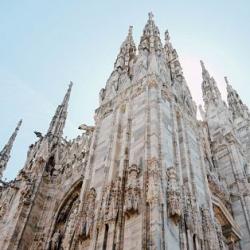LISTEN TO e.e. cummings READ HIS OWN POEM
i thank You God for most this amazing
day:for the leaping greenly spirits of trees
and a blue true dream of sky; and for everything
which is natural which is infinite which is yes(i who have died am alive again today,
and this is the sun’s birthday; this is the birth
day of life and of love and wings: and of the gay
great happening illimitably earth)how should tasting touching hearing seeing
breathing any–lifted from the no
of all nothing–human merely being
doubt unimaginable You?(now the ears of my ears awake and
now the eyes of my eyes are opened)e.e. cummings (1894-1962)
I hope to write on David Bentley Hart’s newest book The Experience of God: Being, Consciousness, Bliss once I complete it, but I’m taking my sweet old time reading through the bad girl. In the interim, I felt inspired to reflect a bit on Being, naturalism, wonder and how e.e. cummings (surprisingly perhaps, though perhaps not) points us in the right direction, namely towards God.
 Hart begins his third chapter, the chapter dedicated to Being, with noting that “the beginning of all philosophy, according to both Plato and Aristotle, lies in the experience of wonder.”1 There are times when he seems to try a bit too hard to be poetic in his prose but his description of the feeling of awe and wonder when the ears of our ears are awake and the eyes of our eyes are opened is not one of these times.
Hart begins his third chapter, the chapter dedicated to Being, with noting that “the beginning of all philosophy, according to both Plato and Aristotle, lies in the experience of wonder.”1 There are times when he seems to try a bit too hard to be poetic in his prose but his description of the feeling of awe and wonder when the ears of our ears are awake and the eyes of our eyes are opened is not one of these times.
Hart writes:
One might go further [than Plato and Aristotle] and say that the beginning of all serious thought – all reflection upon the world that is not merely calculative or appetitive – begins in a moment of unsettling or delighted surprise…it is the sudden awareness that no mere fact can possibly be an adequate explanation of the mystery in which one finds oneself immersed at every moment, an abiding amazement that lies just below the surface of conscious thought and that only in very rare instants breaks through into ordinary awareness. (87)
In the dawn of life we sense with a perfect immediacy, which we have no capacity or inclination to translate into any objective concept, how miraculous it is that – as Angelus Silesius (1624-1677) says – “Die Rose ist ohne warm, sie blühet, weil sie blühet”: “The rose is without ‘why’: it blooms because it blooms.” As we age, however, we lose our sense of the intimate otherness of things; we allow habit to displace awe, inevitability to banish delight; we grow into adulthood and put away childish things. Thereafter, there are only fleeting instants scattered throughout our lives when all at once, our defenses momentarily relaxed, we find ourselves brought to a pause by a sudden unanticipated sense of the utter uncanniness of the reality we inhabit, the startling fortuity and strangeness of everything familiar: how odd it is, and how unfathomable, that anything at all exists.” (88)
One realizes that everything about the world that seems so unexceptional and drearily predictable is in fact charged with an immense and imponderable mystery. In the instant one is aware, even if the precise formulation eludes one, that everything one knows exists in an irreducibly gratuitous way: “what it is” [a things ‘essence’] has no logical connection with the reality “that it is” [a things ‘existence’]; nothing within experience has any “right” to be, any power to give itself existence, any apparent “why.” The world is unable to provide any account of its own actuality, and yet there it is all the same.” (88-89)
Thus one lives and moves and has one’s being only at the sufferance of an endless number of enabling conditions, and becomes what one will be only by taking leave of what one has been. Simply said, one is contingent through and through, partaking of being rather than generating it out of some source within oneself; and the same is true of the whole intricate web of interdependencies that constitutes nature.” (93)
To sum up Hart here, the question of Being is simply the question of existence. This question of existence, the fact that we do exist or that anything exists rather than does not exist, seems to me to be the strongest theistic argument (at least philosophically). Existence requires a first cause. Something can’t come from nothing. Thus, Hart argues that “the question of existence is real, comprehensible, and unavoidable, and yet it lies beyond the power of naturalism to answer it, or even to ask it.” (95) In order to answer the question “Why is there something rather than nothing?” in any reasonable way, I believe one must inevitably refer to God. Belief in the existence of God is not an irrational thing.
This Naturalism to which Hart refers, asserts that nothing exists apart from the physical order (stardust?) and there is nothing supernatural about existence. That which exists is exhausted by the material world. Or, in the words of Madonna, “You know that we are living in a material world / and I am a material girl.”
Perhaps Naturalism’s greatest weakness is that “it is radically insufficient in its explanatory range.” (18) Naturalism, according to Hart, suffers from “explanatory poverty” and can “never serve as a complete, coherent, or even provisionally plausible picture of reality as a whole” because “physical reality cannot account for its own existence for the simple reason that nature – the physical – is that which by definition already exists; existence… lies logically beyond the system of causes that nature comprises.”(96) The physical world is necessarily contingent – every thing’s existence depends on a previous thing. Some necessarily un-created, un-contingent, un-etc. Being must have existed “before” and been the cause that brought about the existence of both the chicken and the egg.
It is not at all irrational to think that there must be some pre-existent and external Being outside of reality as we know it. When one is confronted with the wonder of the beauty, order and precision of the physical order, it’s no surprise that we look “outside” or “beyond.” That said, this can express itself in surprising hypotheses. For instance, when confronted with the objectivity and reality of mathematics, it seems to necessarily point to a mathematical law creator. An article in the NYT on this very topic appears in today’s Sunday paper. About mathematical knowledge, Edward Frenkel writes the following in his article “Is the Universe a Simulation?”: “Its [that is, mathematics’] truths are objective, necessary and timeless.”2 Consequently, some very intelligent people, like Oxford philosopher Nick Bostrom, think that it is more likely than not that we live in some sort of Matrix-like computer simulation created by some very advanced computer programmer in the future and the mathematical “laws” humans discover are simply snippets of the code the programmer wrote. Yes: this was published in the New York Times this morning. Crazy but it supports the reasonableness of the claim that there must be someone “before” us. Thus, the Matrix-computer-programmer hypothesis really isn’t that far fetched but it doesn’t solve any sort of problem; it just pushes the real problem back a step (who created him/her/it?).
Naturalism can’t explain whence we came or where we’re going (at least not in any ultimate sense). I suppose a naturalist would argue that the purpose of existence is to continue to exist and to propagate in such a way that one’s genes stay in that gene pool. However, without any compelling (or even any particular) telos, I’m not sure why it’s better to exist than not to exist; why it’s better to be and do good rather than to be and do evil; or why we ought to seek truth rather than un-truth (cf. Nietzsche), etc.
I love this poem by e.e. cummings because it captures the wonder, joy, and gratitude that ought to be our response at the gratuitousness of existence. His manipulation of formal syntax leads to a playfulness that seems to be absolutely fitting to what he’s saying– the form fits the content.
The first stanza captures his delight in absolute marvel of existence and this delight expresses itself as gratitude directed to God. He thanks God for everything which is natural – the physical order – and this existence is characterized by everything which is “yes.” He captures the wonder of the effervescence of life, of being.
The question, which is the third stanza, serves as an indictment of naturalism:
how should tasting touching hearing seeing
breathing any–lifted from the no
of all nothing–human merely being
doubt unimaginable You?
He rehearses all our senses but one – feeling – and essentially asks, “How could any human being with all her faculties, a person – breathing – who experiences life doubt God?” How could a human being, one who lives and moves and breathes, who is “lifted from the no of all nothing,” lifted from non-existence doubt the existence of God? Should not the mere reality of existence direct our gaze and gratitude to God?
The answer seems obvious and yet cummings’ question is coy: the reasons humans can and do doubt the existence of God is because he is “unimaginable.” Just as “the ‘distance’ between being and nonbeing is qualitatively infinite”(97) so also is there an infinitely qualitative difference between God and human beings (cf. Kierkegaard and then Barth), being Creator and created, between Absolute and contingent.
That God is, (apart from some important metaphysical qualities) does not necessarily tell us what God is like. There seem to be limits to how far the wonder of existence via the natural can take us. And so, like e.e., the supernatural needs to infuse the natural. We need the ears of ears to come awake and the eyes of our eyes to be opened. We need our natural faculties to be illuminated by revelation.
1.David Bentley Hart, The Experience of God: Being, Consciousness, Bliss (Yale University Press, 2013), 87. Because I’ll be referring to the book so frequently, I’m just going to throw page references for the rest of the citations right there in the text.
2. Edward Frenkel, “Is the Universe a Simulation?”, New York Times, Sunday, February 16, 2014.











